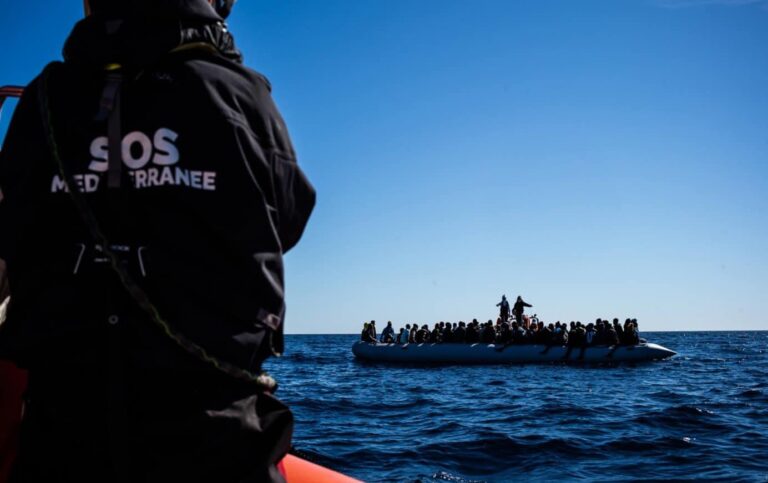There will be migration flows at the center of the upcoming summits between European Union heads of state and governments.
This is a return to the top of the political agenda after years of summits devoted to the pandemic, Next GenerationEu or the aftermath of the war in Ukraine. In this article, we will discuss why.
Table of Contents
Migration flows: old problem, old solutions
The 64 percent increase in irregular border crossings (about 330 thousand in 2022) and 46 percent increase in asylum applications (almost 924 thousand) seem to worry Brussels and other European capitals.
In addition there are the figures, at an all-time high, of asylum applications submitted by citizens of countries traditionally considered “safe,” such as Turkey, Bangladesh, Morocco, Georgia, Egypt or Peru.
The strategies of the various states to counter the phenomenon do not actually seem to contemplate major innovations.
Austria is asking to use EU funds to finance a wall along the Bulgaria-Turkey border. Italy is pushing for a European code of conduct to regulate the activities of NGO rescue ships in the Mediterranean. Denmark is seeking support for establishing reception centers for asylum seekers outside European territory.
The European People’s Party, the largest group in Parliament, also appears to have adopted stricter positions on immigration than it once did.
Solidarity and the Pact on Migration
“Migration is a European challenge that must be met with a European response,” Commission President Ursula von der Leyen wrote.
The Commission is on the one hand promoting increased returns of irregular migrants. While on the other hand it is always trying to advance its Pact on Migration. Namely, the package of migration policy reforms proposed in September 2020. And still stalled on the most significant points.
The one on which it really seems impossible to move forward concerns the redistribution within the EU of asylum seekers who enter one of the border countries irregularly. Under the so-called Dublin Regulation, first adopted in 2013 and still in force, an asylum seeker can only apply in the country of first entry.
This system has been widely criticized by both some governments and civil society organizations. Because it would impose a disproportionate burden on EU border states. Especially those bordering the Mediterranean Sea.
Read also: The 10 largest refugee crises happening in 2022
What is the “effective solidarity” mechanism
But all attempts to change the regulation have so far been in vain. Some states, in fact, simply reject any program that would involve the transfer of migrants throughout the Union.
In fact, the Pact on Migration proposes an “effective solidarity” mechanism. Which would be activated if an EU country found itself “under pressure or at risk of being under pressure” due to a high number of migrant arrivals.
Other states would then have three options available to them. Firstly, accepting the relocation of a quota of asylum seekers on their territory. Secondly, taking charge of the repatriation of a quota of people denied asylum. Or thirdly, funding a series of “operational measures” in the country under pressure. Such as reception centers and means of transportation.
Each country’s contribution would be calculated based on Gross Domestic Product and population. And would be mandatory for all 27 EU members. For this very reason, it is difficult for the mechanism to be accepted. Countries such as those in the Visegrad group (Poland, Hungary, Czechia and Slovakia) are strongly opposed to any kind of compulsory relocation.
On the other hand, states such as Germany, France, Italy or Greece consider the mechanism to be too “soft”. Thus leaving two options available to countries that do not involve the effective redistribution of people.
In the meantime, a voluntary relocation mechanism set up with the support of 19 EU countries plus Norway, Iceland, Switzerland and Liechtenstein has so far resulted in 435 actual relocations out of a planned quota of 8,000 on an annual basis. A small step forward, but certainly not enough to please the countries that feel most exposed to the incidence of flows.
Read also: How many Ukrainian refugees are there, and where have they gone?
The repatriation problem
This is also why the European Union seems intent on using its policies toward third countries as a kind of negotiating leverage in the migration issue.
At the moment, EU countries are failing to repatriate the vast majority of foreigners found illegally on their territories. With more than 342,000 return decisions issued in 2021, about 80,000 individuals involved have actually returned to their country of origin. Less than a quarter of the total.
Several governments would like to invoke Article 25a of the EU Visa Code to introduce restrictive measures against “uncooperative” countries. Instead, Commission President Von der Leyen in her letter speaks of joint projects to combat human trafficking and cooperation to speed up returns and curb departures.
Symbolic of this trend are funds to support the Libyan Coast Guard, tasked with fighting human traffickers and preventing departures from its shores to Europe. A total of 800 million euros are allocated for North Africa until 2024, explained European Commissioner for Enlargement and Neighborhood Olivér Várhelyi.
But for many experts, externalizing asylum policy ignores the fundamental reasons that drive migration flows. Such as economic hardship, discrimination and climate change, and can lead to human rights violations and illegal detentions outside the EU, as is already blatantly the case in Libya.
Indeed, the debate in Brussels seems to focus heavily on the external dimension of the issue. Border control, repatriations of irregular migrants, the relationship between the EU and the many countries of origin. And the increasing number of attempts to prevent arrivals.












